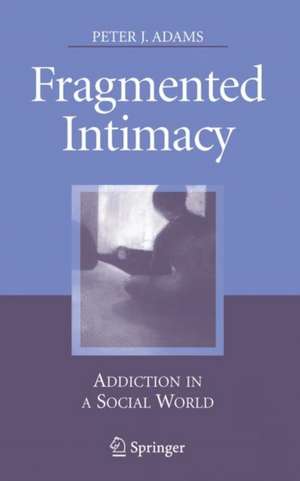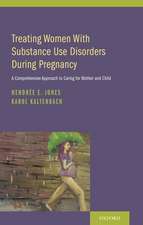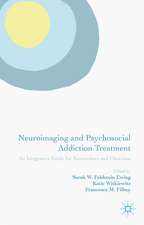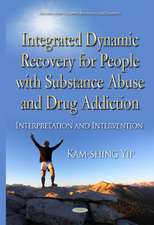Fragmented Intimacy: Addiction in a Social World
Autor Peter J. Adamsen Limba Engleză Hardback – 6 dec 2007
| Toate formatele și edițiile | Preț | Express |
|---|---|---|
| Paperback (1) | 371.83 lei 6-8 săpt. | |
| Springer – 29 oct 2010 | 371.83 lei 6-8 săpt. | |
| Hardback (1) | 376.78 lei 6-8 săpt. | |
| Springer – 6 dec 2007 | 376.78 lei 6-8 săpt. |
Preț: 376.78 lei
Preț vechi: 396.62 lei
-5% Nou
Puncte Express: 565
Preț estimativ în valută:
72.09€ • 75.48$ • 59.66£
72.09€ • 75.48$ • 59.66£
Carte tipărită la comandă
Livrare economică 05-19 aprilie
Preluare comenzi: 021 569.72.76
Specificații
ISBN-13: 9780387726601
ISBN-10: 0387726608
Pagini: 339
Ilustrații: XII, 340 p.
Dimensiuni: 155 x 235 x 25 mm
Greutate: 0.62 kg
Ediția:2008
Editura: Springer
Colecția Springer
Locul publicării:New York, NY, United States
ISBN-10: 0387726608
Pagini: 339
Ilustrații: XII, 340 p.
Dimensiuni: 155 x 235 x 25 mm
Greutate: 0.62 kg
Ediția:2008
Editura: Springer
Colecția Springer
Locul publicării:New York, NY, United States
Public țintă
Professional/practitionerCuprins
Theory.- Addiction in Perspective.- A Social World.- Addiction and Connecting.- Responding to Addiction.- Processes.- Becoming Intimate.- Intimacies in Addictive Contexts.- Intimacy and Power.- Families and Communities.- Fragmented Lives.- Collective Opportunities.- Reintegration.- Applications.- Family Resources.- Mobilizing Communities.- Applications to Practice.- Looking Ahead.
Recenzii
From the reviews:
"Adams (population health, U. of Auckland) uses a social-ecological approach to address the needs of the addicted and those around them. He closely examines the ways addiction disrupts intimacy, leading to cycles of loss and isolation, and the means by which the addicted and those around them can re-engage. … He provides a significant amount of material about applying these concepts directly to practice at the family and community level." (www.booknews.com, April, 2008)
"Adams provides a refreshing, needed analysis that complements new scientific discoveries; he goes beyond biological and neuropsychological explanations to explore the reciprocal influences of social context and addiction. … Adams’s coverage is novel, and the book is more comprehensive than previous works have been. He offers a solid theory and integrates empirical support throughout his discussion. … this volume can serve as a library resource, a textbook, or a clinical manual. Summing Up: Highly recommended. All readers, all levels." (M. Bonner, CHOICE, Vol. 45 (10), June, 2008)
"Adams (population health, U. of Auckland) uses a social-ecological approach to address the needs of the addicted and those around them. He closely examines the ways addiction disrupts intimacy, leading to cycles of loss and isolation, and the means by which the addicted and those around them can re-engage. … He provides a significant amount of material about applying these concepts directly to practice at the family and community level." (www.booknews.com, April, 2008)
"Adams provides a refreshing, needed analysis that complements new scientific discoveries; he goes beyond biological and neuropsychological explanations to explore the reciprocal influences of social context and addiction. … Adams’s coverage is novel, and the book is more comprehensive than previous works have been. He offers a solid theory and integrates empirical support throughout his discussion. … this volume can serve as a library resource, a textbook, or a clinical manual. Summing Up: Highly recommended. All readers, all levels." (M. Bonner, CHOICE, Vol. 45 (10), June, 2008)
Notă biografică
Peter Adams has a practice background in clinical psychology and an academic background in critical social theory. He is currently Director of Social and Community Health at the School of Population Health, Auckland University, Auckland, New Zealand. He has developed and taught in postgraduate programs on addictions for the past ten years. Ideas for the book evolved from his 25-year involvement in research, teaching, and clinical intervention involving different aspects of addiction.
Textul de pe ultima copertă
Fragmented Intimacy transcends familiar concepts of addiction by focusing not on addicts in isolation but on the social contexts that are disrupted and on the struggle that affects all those involved as they attempt to regroup and initiate change. Applicable to drugs, alcohol, and gambling, this engagingly written book offers both innovative theory and practice-strengthening interventions.
Peter Adams’ social-ecology framework examines in depth how addiction disrupts social identity, becoming the dominant relationship in a person’s life and leading thereby to a weakening of connections to family, friends, workplace, and community. It examines how in the long-term course of an addiction one-on-one counseling will have little effect unless it assists in the re-engagement of these core intimacies. The author enhances the reader’s understanding with vignettes of addicted individuals’ lives as relationships are altered (and insights from such chemically-intimate authors as Burroughs and Poe), new takes on the therapeutic relationship, and examples of families, neighborhoods, and communities mobilizing as powerful forces for re-entry.
A sample of the coverage:
Peter Adams’ social-ecology framework examines in depth how addiction disrupts social identity, becoming the dominant relationship in a person’s life and leading thereby to a weakening of connections to family, friends, workplace, and community. It examines how in the long-term course of an addiction one-on-one counseling will have little effect unless it assists in the re-engagement of these core intimacies. The author enhances the reader’s understanding with vignettes of addicted individuals’ lives as relationships are altered (and insights from such chemically-intimate authors as Burroughs and Poe), new takes on the therapeutic relationship, and examples of families, neighborhoods, and communities mobilizing as powerful forces for re-entry.
A sample of the coverage:
- Rethinking addiction through the lens of intimacy.
- Social processes in intimacy versus social processes in addiction.
- Effects of addiction throughout the individual’s social networks.
- Opportunities for intervention at different stages of addiction.
- Resilience building at the individual, family, and community levels.
- Guidelines for family members in initiating change.
- Using social approaches to complement mainstream forms of therapy—starting with assessment.
Caracteristici
Presents a social complement to the mainstream “particle” or individualized approaches developed in most other books on addiction Integrates recent advances in theory on community capacity building, resilience, and social ecology Has a practical focus, with early content leading to the practical applications in Part IV Is written in an accessible and engaging style, with numerous vignettes, “key points,” and illustrations to highlight the relevance of content to everyday experience Includes supplementary material: sn.pub/extras








